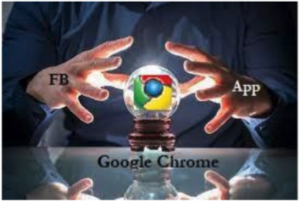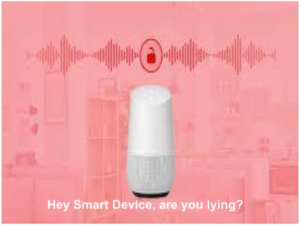My Browser is a Psychic
By Savita Chari | October 28, 2022

The other day I accompanied a friend to the local drug store. While she was shopping, I was browsing. I was tempted to buy my favorite chocolate, but the calorie count made me put it back. Next day as I opened the facebook app, an ad for that very brand of chocolate popped up with a coupon. Was it just a coincidence or can facebook read my mind?
Then, one day I started seeing email deals and ads promoting cruise ship adventures. I was dumbfounded because the previous night on the dinner-table my family was discussing our next vacation. Is my home bugged? How did my browser know that I wanted a cruise vacation? We had not yet started searching on the internet. This left me very uncomfortable.
Like all smart people, I decided to check if other people had similar experiences. I whipped out my phone and asked my trusted ‘Hey Google’ to search. Then it struck me, if google can listen to my question, can it also listen to my other conversations? Could it be possible that without my knowledge, all my conversation was being tracked by my android devices? Turns out, I am not the only one experiencing this. Chat forums such as Reddit and Quora have many people describing their own experience of seeing ads based on private in-person or online conversations. Google vehemently denies that it eavesdrops and states that according to its content policy for app developers, apps cannot listen unless specifically allowed to do so and in active use.
As reported by BBC, two Cybersecurity experts Ken Munro and David Lodge of Pen Test Partners , performed an experiment1 to see if it was physically possible for an android phone to listen to conversation, when not in use. They used APIs provided by Android platform to write a small prototype app with mic enabled. Low and behold, it started recording entire conversation within the vicinity of the phone, even though the experimental app was not in use. There was no spike in data usage because the wi-fi was enabled and the battery did not drain much to raise any alarms.
A Bloomberg report5 cited people with inside knowledge that Facebook and Google hired many contractors to transcribe audio clippings of its users.
An article by USAtoday
6 reported an investigation done by a Dutch
broadcaster VRT where they proved how Google Smart Home devices eavesdrop and record all private conversations happening in our homes. Google contractors listen to these audio recordings and use them to enhance their offerings (aka serve targeted ads).
Yes, our homes are bugged!

Serving ads online can only go so far to entice us. Companies know that in order to increase revenue, ads should be served at the time when we are shopping. This is made possible with the advent of Bluetooth Beacon.
These small bluetooth devices are strategically placed in various locations in
a store or an enclosed mall and they communicate with our smartphone via bluetooth. Due to bluetooth technology they know our precise location and are able to serve us ads or promotional deals in realtime. No wonder, these days all stores encourage us to download their apps. These beacons communicate with the app and send information like, what are we browsing, where are we lingering etc. Armed with this knowledge the apps send us notifications related to promotions on those items to encourage us to buy them while we are in the store and are more likely to spend extra.
Even if we don’t have the store app installed, there is a stealth-industry of third-party location-marketing companies that collect data based on where we pause in an aisle to examine a product, which translates to our possible interest. These companies take their beacon tracking code and bundle it into a toolkit that is used by other app developers. They are paid in cash or kind ( free reports) to combine these toolkits with the apps. The idea is to get to as many mobile phones as possible.
Mostly these third-party companies are very small and go bankrupt at the drop of a lawsuit and another one crops up in its place. The collected data is sold to big consumers like Facebook, Google etc. who already have a plethora of data on us from various sources. In their privacy statements, they mention these “third–party” partners, who help them serve targeted ads and promotion to us.

Picture Credit NyTimes11
Now I know how I got the ad for that chocolate.
So much for clairvoyance!



